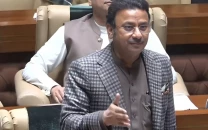WATCH: Salat al-Istisqa offered across the country on Prime Minister's appeal
Prime Minister’s appeal leads to nationwide Salat al-Istisqa, with prayers for the relief from smog.
1731666526-0/Express-Tribune-(9)1731666526-0-640x480.webp)
Salat al-Istisqa (prayer for rain) was offered across various cities of Pakistan, on the appeal of Prime Minister Shehbaz Sharif.
The central congregation for the prayer took place at the Faisal Mosque in Islamabad, with a large number of people participating after the Friday prayers.
The prayer aimed to seek divine mercy for rain and relief from the ongoing drought and smog-related health issues.
1731666892-0/Express-Tribune-(10)1731666892-0.jpg)
The Ministry of Religious Affairs, following the Prime Minister's request, directed authorities at both federal and provincial levels to organize Salat al-Istisqa.
A circular was issued to ensure the prayer was conducted in all four provinces, Gilgit-Baltistan, and Azad Kashmir. The communication emphasised that the recent dry spell had led to serious health challenges and worsening smog conditions.
The public was urged to pray for forgiveness and ask for God's mercy, hoping for a much-needed downpour.
In Lahore, after the Salat al-Istisqa, Chairman of the Islamic Ideology Council, Dr. Raghib Hussain Naeemi, spoke to the media, emphasising the importance of seeking forgiveness from Allah.
He also expressed hopes that divine mercy would bring relief from diseases and the ongoing drought.
Dr. Naeemi also highlighted that the Council had urged the government in 2022 to take action against websites that insulted the Prophet Muhammad (PBUH) and his companions, and appreciated the government's efforts in closing down such sites.
Prime Minister Shehbaz Sharif's call for prayer was not only a plea for rain but also a reminder of the moral and social responsibilities of the nation.
He specifically requested religious scholars and spiritual leaders to actively participate in the prayer and guide the masses in asking for God's mercy.
Earlier today at 12:00PM, Lahore has slipped to second place in the global pollution rankings, with New Delhi overtaking the city to claim the top spot as the world’s most polluted on Friday.
The air quality index (AQI) in Lahore has reached hazardous levels, with readings soaring to 780 AQI, signaling a significant environmental and public health crisis.
The thick smog has enveloped much of Punjab's plains, severely reducing visibility and causing widespread disruption. The dense fog has caused zero visibility in several areas, leading to the closure of key motorways.



















COMMENTS
Comments are moderated and generally will be posted if they are on-topic and not abusive.
For more information, please see our Comments FAQ